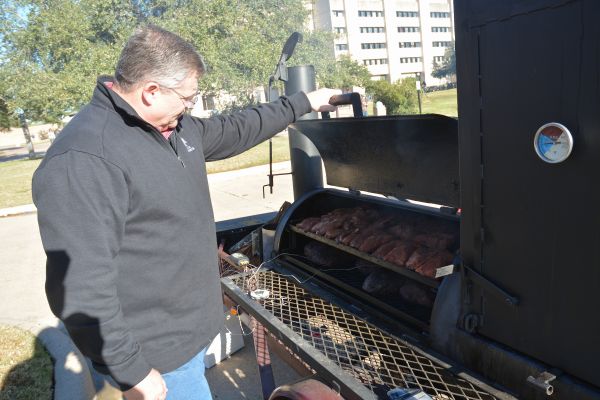Source: AgriLife Today | June 7, 2019

Now that the weather is more conducive to grilling and other forms of outdoor cooking, it’s important to keep a clean workspace and ensure meats are properly stored and prepared, said Dr. Jenna Anding, nutrition and food science associate department head, Texas A&M University, College Station.
“It’s important to maintain food quality and freshness by ensuring proper temperatures during storage and cooking,” Anding said. “You need to begin by choosing meat, poultry or seafood that’s fresh and of high quality. Select your meat last and get it home as soon as possible. If the trip from the store to your home is more than a half-hour, take a cooler for the items you need to refrigerate.”
She said poultry, fish, seafood or ground beef should be cooked or frozen within a day or two of purchase. Steaks or pork chops should be cooked or frozen within four to five days.
“Also, the safest way to thaw meat or poultry is by placing it in the refrigerator a day or two before you plan to cook it,” she added. “You can also thaw in the microwave, but if you do, cook the food right away.
She also noted some meats defrosted in the microwave may not thaw out evenly and other parts of the food may be partially cooked, so it’s better to let them thaw in the refrigerator.
Regardless, Anding said, never thaw meats at room temperature as this may increase the number of germs related to foodborne illness.
“If refrigerated food is being transported to another location for cooking, it should be kept at 40 degrees or colder, using a cooler and ice or ice packs,” she said. “And you should only take what you plan to cook and eat that day.”
She also said raw meat, poultry or seafood should be tightly wrapped or stored in a sealed bag or container and kept in a different cooler than other foods.
“This will reduce the risk of cross-contamination,” Anding said.
If cooking away from home and not sure about a water source, take a container of fresh water and paper towels or use antibacterial towelettes or hand sanitizer, she said.
“Be sure to wash hands before and after touching raw meat, poultry or seafood, making sure food preparation surfaces, cutting boards, grilling utensils and serving platters are washed and sanitized,” she said.
Anding said unwashed utensils and platters can still contaminate food, even if proper food storage, preparation and cooking standards have been maintained.
“If you’ve placed raw meat or fish on a platter before grilling, do not use that same plate to serve the food unless it can be cleaned with hot, soapy water first.”
Anding said foods on a grill can brown quickly and look as though they are sufficiently cooked when they are not, so a food thermometer is the only way to ensure foods are heated to a safe internal temperature.
“Cook all poultry to 165 degrees, fully cook meats like hot dogs to 165 degrees and hamburgers to 160 degrees,” she said. “Beef, pork, lamb, veal steaks, chops and roasts should be cooked to at least 145 degrees. For safety and quality, however, allow these foods to rest for a few minutes after removing them from the grill before serving.”
After cooking, Anding said, be sure to keep the food hot until it is served — at least 140 degrees — otherwise, eat or refrigerate it right away.
“Keep food covered and never let it sit out for more than two hours,” she said. “If the weather is 90 degrees or hotter, eat or store your food within one hour.”
For more information, go to the U.S. Department of Agriculture’s Food Safety and Inspection Service fact sheet at https://bit.ly/2vSo2nY.
